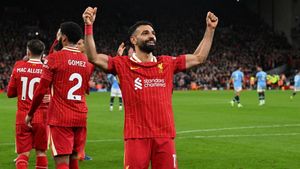Manchester City has found itself at a crossroads, facing unexpected challenges as the Premier League evolves beyond the familiar confines of the 'Big Six' dominance. Once the undisputed kings of English football, City is adjusting its tactical approach as the competition intensifies substantially this season.
The Premier League has long been characterized by the presence of the 'Big Six', which included Manchester City, Liverpool, Manchester United, Chelsea, Arsenal, and Tottenham Hotspur. Over the last years, these teams have shared titles almost uniformly, with City dominating by winning eight league titles since the 2009-10 season. This systematic distribution of glory has made the league thrilling but predictable as these powerful clubs consistently battled for supremacy.
Yet, the recent Premier League season has highlighted cracks within this standard framework. Manchester United and Tottenham Hotspur, two clubs traditionally aligned within the lofty ranks of the top six, have underperformed, leaving the door ajar for other clubs to step up. This shift got the attention of fans and pundits alike, as the foundation of the 'Big Six' begins to shake. Newcastle United, now backed by Saudi investments, is part of this new wave of teams eager to disrupt the status quo.
According to the Daily Mail, the introduction of substantial investments from teams like Newcastle has altered the competitive balance of the league. The Premier League's broadcasting revenue distribution policies are, perhaps, the unsung hero behind this sudden democratization of wealth. While many leagues follow rigid patterns of revenue sharing, the Premier League distributes its broadcasting revenue equally among its 20 clubs. Reports indicate they rake in roughly 3 trillion won annually. About half of this is split evenly, which allows lower-tier clubs to possess significant funds to attract talent.
This fair distribution model has resulted in a more competitive environment, as clubs no longer scramble for the crumbs left by the traditional powerhouses. It has enabled smaller teams to recruit effectively without the prior financial constraints. The last couple of seasons with teams like Aston Villa making headlines by snatching up former international players demonstrates just how much the financial playing field has leveled.
Manchester City must now re-evaluate its approach as it attempts to maintain its reputation amid competition rising around it. Although they continue to play with finesse, questions linger concerning whether they can reclaim their position atop the league. The tactical adjustments need to keep pace with the frenetic evolution of the Premier League, as teams now battle not just for titles but to cement themselves within this newfound competitive atmosphere.
The situation will be particularly acute as Manchester City prepares for its upcoming matches. Games against newly fortified sides like Newcastle will require the team to embrace adaptability not previously necessary. This means assessing player fitness, game tactics, and overall strategy with laser focus. Failure to do so could result not only in losses but also the potential of falling out of the Champions League qualification spots, something unthinkable just two seasons ago.
Already, the pressures are mounting. The likes of Liverpool and Chelsea appear to be rising to the occasion, aiming to reassert their dominance, increasing the urgency for City to seize momentum back. Their influence among the top four is fading—and with it, their grip on English football supremacy could dissipate if tactical innovations aren't quickly embraced.
The tactical discussions surrounding Manchester City are reflective of larger trends extended across the league and signal the end of one era and the cautious emergence of another. This modern Premier League isn't just about big money and star-studded lineups; it's increasingly about strategic acumen, adaptability, and the ability to dynamically change when it matters most.
At the same time, history teaches us to expect the unexpected. The beautiful game has moments when clubs once excellent can collapse, just as new clubs discover their footing. Somewhere between Manchester City’s adjustments and the rise of their new rivals lies the unpredictable nature of football, making every match day uncertain and exciting.
With the Premier League's continuing evolution, both City and its rivals must adapt or be relegated to the sidelines of English football history. The next few matches will not only determine the season's success or failure but may reflect the future of football's competitive fabric.



